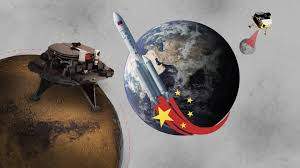China Launches Experimental Spaceplane

Source: https://www.wsj.com/articles/china-launches-experimental-spaceplane-11599217896
China has claimed success in the secretive launch of an experimental spaceplane, recording the latest in a series of milestones for the country’s space program.
The rocket-mounted reusable spacecraft was lofted into orbit Friday from the Jiuquan Satellite Launch Center in northern China’s Gobi Desert, the official Xinhua News Agency said.
Unlike with recent high-profile missions, China’s National Space Administration didn’t announce the launch ahead of time. The mission will test the craft’s technology and “provide technical support for the peaceful use of space,” Xinhua said, without disclosing further details about its capabilities or the planned duration of its time in orbit.
Both China and the U.S. have secretive programs to develop unmanned, reusable spaceplanes. Last year, the U.S. Air Force’s X-37B Orbital Test Vehicle, which resembles a miniature version of the retired Space Shuttle, completed a 780-day mission in orbit.
A separate U.S. Experimental Spaceplane development program being run by Boeing Co. and the Defense Advanced Research Projects Agency was abandoned earlier this year.
China has been working on its own spaceplane since at least 2007, when images of a craft known as the Shenlong slung beneath the wing of a Chinese bomber first circulated widely in Chinese media. A state-run television station in northern China’s Shaanxi province reported in 2011 that the Shenlong had conducted a suborbital flight, though little else is known about the top-secret program.
Xinhua didn’t disclose whether the vehicle launched Friday was a version of the Shenlong or a completely new spacecraft.
Last year the state-run China Academy of Aerospace Aerodynamics released images it said showed wind-tunnel tests of a prototype spaceplane with the capability to launch horizontally from a larger aircraft before using a powerful propulsion system to blast itself into orbit.
China launched its first mission to Mars in July, the latest in a string of missions that have underscored its growing challenge to the U.S.’s long-held status as the world’s leading space power. The country aims to have an operational space station by 2022 and a manned lunar base by 2045.
Last year, the U.S. established a military Space Command to counter perceived threats in space, chiefly from China and Russia.
Photo and Link: https://www.wsj.com/articles/china-launches-experimental-spaceplane-11599217896











